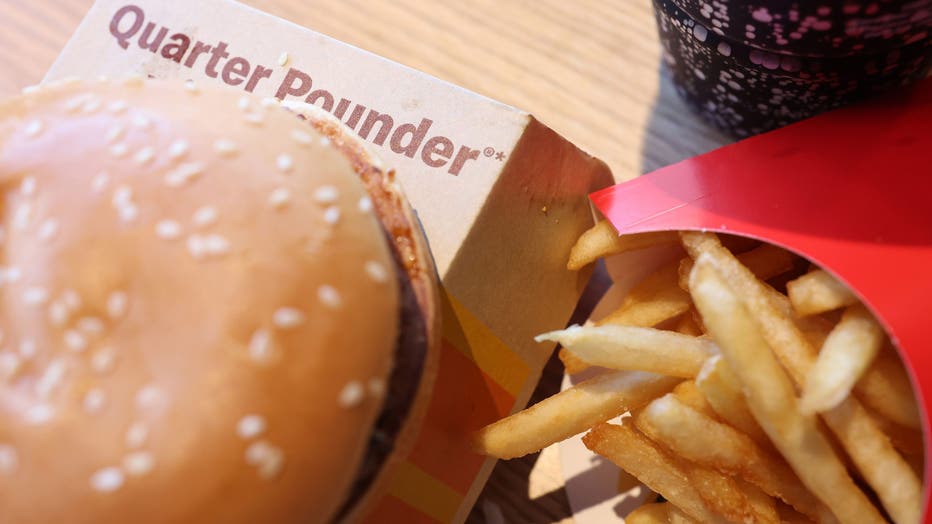McDonald's E. coli outbreak expands: At least 75 now sickened
McDonald's E.Coli outbreak: What to know
A widespread E. coli outbreak has been linked to a McDonald’s product, according to the U.S. Centers for Disease Control and Prevention (CDC). LiveNOW's Carel Lajara spoke about the outbreak with Dr. Matthew Wise, Branch Chief of the CDC's Outbreak Response and Prevention Branch.
The McDonald’s E. coli outbreak tied to Quarter Pounders has expanded: At least 75 people have been sickened in 13 states, the CDC said Friday.
That’s up from the 49 illnesses in 10 states reported Tuesday.
Twenty-two people have been hospitalized, the Centers for Disease Control and Prevention said. Two people have developed a dangerous kidney disease complication, and one person has died.
RELATED: McDonald's E. coli update: Contaminated onions came from California farm, officials say
Colorado has reported more cases than any other state linked to the outbreak. It’s also where the one death occurred.
McDonald's has more than 14,000 U.S. stores and serves millions of Quarter Pounders every week.
What caused the McDonald’s E. coli outbreak?
A preliminary investigation by the U.S. Food and Drug Administration suggested fresh slivered onions that are served raw on Quarter Pounder hamburgers were a likely source of the contamination. McDonald's also serves raw, slivered onions on one of its breakfast sandwiches, but that sandwich isn't available at the impacted stores. Other burgers, like the Big Mac, use diced, cooked onions.
RELATED: Frozen waffle recall over listeria concerns expanded: see the product list
McDonald's officials said the contaminated onions came from Taylor Farms, of Salinas, California.

A McDonalds Quarter Pounder hamburger meal is seen at a McDonalds on October 23, 2024 in the Flatbush neighborhood in the Brooklyn borough of New York City. An E. coli food poisoning outbreak linked to McDonald’s Quarter Pounder hamburgers has sicken
U.S. Foods, a major wholesaler to restaurants across the country, said Thursday that Taylor Farms had issued a recall this week for peeled whole and diced yellow onions for potential E. coli contamination. The recalled onions came from a Taylor Farms facility in Colorado, a U.S. Foods spokesperson said. But the wholesaler also noted that it wasn't a McDonald's supplier and that its recall didn't include any products sold at the fast-food chain's restaurants.
Taylor Farms did not respond to multiple requests for comment, and the U.S. Food and Drug Administration would not confirm that the agency is investigating Taylor Farms. A spokesperson told the Associated Press Thursday that the agency is "looking at all sources" of the outbreak.
Where has McDonald’s pulled Quarter Pounders from the menu?
McDonald’s said its Quarter Pounders were removed from restaurant menus in the following states:
- Colorado
- Kansas
- Utah
- Wyoming
Quarter Pounders have also been removed from menus in portions of:
- Idaho
- Iowa
- Missouri
- Montana
- Nebraska
- Nevada
- New Mexico
- Oklahoma
It’s unclear if McDonald’s has removed the burger from other states and menus since the latest numbers were released Friday.
Which other fast-food restaurants have stopped using fresh onions?
Other fast-food restaurants — including Taco Bell, Pizza Hut, KFC and Burger King — have temporarily pulled onions from some menus.
"As we continue to monitor the recently reported E. coli outbreak, and out of an abundance of caution, we have proactively removed fresh onions from select Taco Bell, Pizza Hut and KFC restaurants," Yum Brands said in a statement.
Louisville, Kentucky-based Yum Brands wouldn’t say where onions were removed or whether the company uses the same supplier as McDonald’s. Yum Brands said it will continue to follow guidance from regulators and its suppliers.
Restaurant Brands International, which owns Burger King, said Thursday that 5% of its restaurants use onions distributed by Taylor Farms’ Colorado facility. Burger King restaurants get deliveries of whole, fresh onions and its employees wash, peel and slice them.
Even though it wasn't contacted by health officials and it had no indications of illness, Restaurant Brands said it asked the restaurants that received onions from the Colorado facility to dispose of them two days ago. The company said it’s restocking with onions from other suppliers.
What is E. coli?
E. coli bacteria are found in many places, including in the environment, foods, water, and the intestines of people and animals, the CDC says. Infections can cause severe illness, including fever, stomach cramps and bloody diarrhea.
The incubation period for E. coli is only a couple of days, so illness would be quickly apparent to anyone affected, said Donald Schaffner, a food safety expert at Rutgers University. "If you ate these burgers in September, and now it’s the middle of October and you didn’t get sick, you’re probably OK," he said.
Children under 5, adults 65 and up, people with weakened immune systems and international travelers are all at an increased risk for E. coli infection, the agency says.
Those who develop symptoms of E. coli poisoning should seek health care immediately and tell the provider what they ate.
The type of bacteria implicated in the McDonald's case causes about 74,000 infections in the U.S. annually, leading to more than 2,000 hospitalizations and 61 deaths each year, according to the CDC.

